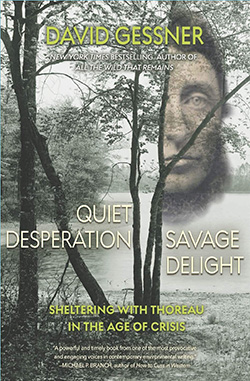If you went to Fenceline Cider in Mancos in late June to hear David Gessner talk about his new book from Torrey House Press, Quiet Desperation, Savage Delight, you would know that Gessner has an active, free-flowing, and very curious mind.
 Riffing on a variety of the themes in the book during the talk, Gessner came across as affable and self-effacing. He also read the opening paragraph of the book, which is a beauty:
Riffing on a variety of the themes in the book during the talk, Gessner came across as affable and self-effacing. He also read the opening paragraph of the book, which is a beauty:
“Sixteen years ago, when our daughter was just a baby, my wife and I took her on a trip to Walden Pond. As we approached the place where Henry David Thoreau’s cabin once stood, with my daughter riding up on my shoulders, I said to her, ‘That’s where the man lived who ruined your father’s life.’”
Henry David Thoreau influences every one of the 377 pages within Quiet Desperation. The subtitle, in fact, is Sheltering With Thoreau in the Age of Crisis. Thoreau is the touchstone for Gessner’s takes on lifestyles, consumption, politics, wealth, solitude, race, abolition, anarchy, civil disobedience (of course), climate, nature and just about any topic Gessner cares to wade into.
Gessner started writing this book as a pandemic project in March of 2020, just as the COVID-19 virus forced worldwide lockdowns. Like Thoreau, Gessner has a shack (albeit on coastal North Carolina). Like Thoreau, Gessner has a superb eye for nature—and detail. Like Thoreau, Gessner has an enviable ability to monitor his thoughts and convert them into crystalline, inviting prose.
The pandemic is cast here as a backdrop — further proof that the world is falling apart. Quiet Desperation could have been written without millions of people dying; there are plenty of other reasons for Gessner to ponder what humans have done to the planet or how humans have chosen to live together. He didn’t need a mass die-off to ponder the fate of grizzly bears in Montana or observing bank swallows on Cape Cod. The drama of the pandemic is a framework, a window to observe. Gessner is generous to include voices past and present — from Zak Podmore to Rick Bass, from Craig Childs to Wendell Berry.
Gessner weaves in memoir, too. We learn about his travels, his family, his friends, the houses where he’s lived and mistakes he’s made. We get the feeling that Gessner could travel to any state, find a place to sit quietly and watch a bird hunt for food, and jot down a brisk and breezy couple of thousand words on whatever news item he’d encountered that morning. We also get the feeling that Gessner could travel to any state, plug into his vast network of like-minded writers and researchers, and spend the evening tossing back a few beers in search of the next spark.
Gessner’s writing is touching, personal, inviting, and calm. Stop and observe, he suggests, and you will find some inner peace to counter all the chaos. But he also knows that the Thoreau model—retreating to the woods, dropping out of society—is hardly what’s needed now.
“The Thoreauvian strategy of doing with less certainly helps, but only on an individual, not global, scale,” writes Gessner. “There are times I feel overwhelmed by my impotence, my smallness, in the face of it. I have strategies to lift myself out of this sense of overwhelm, usually by some sort of activity, but what if all my efforts, all our efforts, can’t stop the darkness coming toward us? Maybe the most honest thing to do is to be with it, let it settle, not ignore it. That was the advice two other writers gave last night on the Zoom event I did with them. My contribution was to quote Isak Dinesen: ‘Write a little every day without hope or despair.’ That’s what I hold onto. Do my work, which is putting words on the page, while trying not to rise too high on hope or sink too low in despair. It isn’t easy.”
No, but David Gessner’s prose makes for easy reading and he delivers a serene and restorative world view.
Mark Stevens is the author of The Allison Coil Mystery Series. Book three in the series, Trapline, won the Colorado Book Award for Best Mystery. Stevens also hosts the Rocky Mountain Writer podcast for Rocky Mountain Fiction Writers. He lives in Mancos, Colo.

